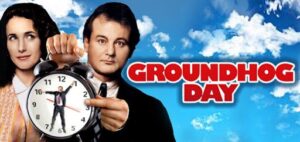If you are like me, then you are still cleaning up candle wax and eating leftover crepes. People who are not as educated as the readers of Baptist News Global may not completely appreciate Groundhog Day, which began — and I am not telling you anything you do not already know — with Candlemas.
In the fourth century, Christians started celebrating Candlemas to commemorate the presentation of Jesus in the temple 40 days after his birth — Feb. 2 being 40 days after Dec. 25.
The weather forecasting — if the groundhog sees its shadow, winter is six weeks from ending — comes from a Scottish couplet: “If Candlemas Day is bright and clear, there’ll be two winters in the year.” Superstitious sailors will not sail on Feb. 2. French Christians eat crepes after 8:00. Americans eat pepperoni pizza — which is a sort of ground hog.
 Every year since 1993, our family has watched Groundhog Day. Bill Murray is a self-centered weatherman trapped living his least-favorite day of the year over and over. This combination of It’s a Wonderful Life and Twilight Zone may not seem like the most heartwarming tradition, but it is a perfect COVID movie.
Every year since 1993, our family has watched Groundhog Day. Bill Murray is a self-centered weatherman trapped living his least-favorite day of the year over and over. This combination of It’s a Wonderful Life and Twilight Zone may not seem like the most heartwarming tradition, but it is a perfect COVID movie.
Phil asks, “What would you do if you were stuck in one place, and every day was exactly the same, and nothing you did ever mattered?”
When Harold Ramis, the director, was asked how long Phil was stuck in the same day, he initially said, “Ten years,” but later decided that it could have been as long as a thousand years.
Phil’s predicament raises important questions: How do we stop living the same day over and over? What does it take to make an ordinary day something more? What would we do if we had all the time in the world?
Phil tries just about everything to get out of this one day, but he does not try the most obvious thing. The question for anyone paying attention is, “Why doesn’t Phil go to the library?”
If we had 100 lives, we could read 100,000 stories. People who do not read get one life, but the person who reads lives a multitude of lives. Mark Twain defined a “classic” as “a book which people praise and don’t read.” Phil could read them all. Imagine how smart he would be if he spent a few centuries in a bookstore.
Most of us read a lot, but we read a lot that does not matter. We read Facebook posts from people who cannot be that happy, angry Twitter fights between people who cannot be that unhappy, and diatribes from writers whose goal is to have a lot of readers rather than give the ones they have any reason to feel happy.
We might think reading what is not worth reading is a new problem, but in the 18th century Voltaire said, “Despite the enormous quantity of books, if one reads profitably, one would realize how much stupid stuff the vulgar herd is content to swallow every day.”
“We read the stupid stuff, and it hurts us.”
We read the stupid stuff, and it hurts us. We used to immerse ourselves in a book for hours, and now it seems harder. Research suggests that the internet diminishes our attention span. The Buzz Feed quiz that says I am Hufflepuff and not Gryffindor — the stupid stuff — makes me less able to concentrate. People who read excessively on screens have a higher risk of depression, because if they lose their ability to focus on the important, the unimportant takes over.
Days start to feel routine. We feel like we are doing the same things we did yesterday and the day before that. We are going to do the same things tomorrow and the day after that. It is Groundhog Day.
We need to read stories that remind us that it can be better. People experience life’s worst and best, and they write their stories. Others read the stories and share with those they care about: “Read this. It’s about us.”
The best stories get passed down and passed around, and some become scripture. We read the stories and learn to recognize the hope that surrounds us. We listen to the stories of Jesus and of those who write about Jesus — Rachel Held Evans, Eugene Peterson, Richard Rohr. We make a writer friend who has been dead for centuries — Teresa of Avila, Brother Lawrence, Thomas a Kempis.
“Our lives are better when what we read is better.”
We read writers who push us. A year ago, my son Graham decided he had read a disproportionate number of books by people like him, so last year he did not read books by straight, white males. Now his perspective is broader, his understanding deeper, and the list of those whose stories he appreciates longer. We read Colson Whitehead, Toni Morrison, Bryan Stevenson. We read poets — Amanda Gorman, Billy Collins, Mary Oliver. We read authors who may not call themselves religious but make us believe there is more than meets the eye.
Our lives are better when what we read is better. The more we read the good stuff, the less attractive the stupid stuff. If we read more thoughtfully, we live more thoughtfully.
Phil Connors could have saved himself a lot of trouble by reading a few great books, but he finally finds a new story. Phil becomes kind. He learns to love. When we read the best stories, we stop living the same day over and over.

Brett Younger
Brett Younger serves as senior minister at Plymouth Church in Brooklyn, N.Y.
Related articles:
Reading good literature can develop skills in empathy and compassion, professor says
GAs Gone Bad: Baptist women you should be reading | Opinion by Susan Shaw


